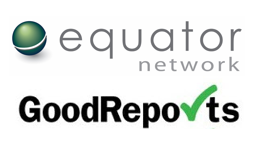 Join the EQUATOR Network GoodReports campaign and the Centre for Journalology & International Society of Managing and Technical Editors (ISMTE) on Saturday 9 September
Join the EQUATOR Network GoodReports campaign and the Centre for Journalology & International Society of Managing and Technical Editors (ISMTE) on Saturday 9 September
EQUATOR are delighted to invite you to register for two unique workshops. At the first, you will hear about recent innovations and experiences, and share ideas on how journals and publishers can effectively implement the use of reporting guidelines to improve the quality of their publications. At the second, you will explore what legitimate journals can do to distinguish themselves from the growing number of predatory journals.
 Morning workshop: 8.00am-12.00pm
Morning workshop: 8.00am-12.00pm
Implementing Reporting Guidelines: Time for Action
The main aim of this workshop is to use evidence and experience of both the workshop participants and speakers to develop a draft one-page EQUATOR “GoodReports” Action Plan – a practical tool for journal editors and publishers to help them integrate the use of reporting guidelines in their editorial and publishing systems.
Workshop speakers: Doug Altman (Director, UK EQUATOR Centre), Caroline Struthers (Education and Training Manager, UK EQUATOR Centre), Jason Roberts (Executive Editor, Headache), Allan Heinemann (co-editor in chief, Archives of Physical Medicine and Rehabilitation), Sabine Alam (Editorial Director, F1000 platforms), Mario Maliki (Netherlands Research Integrity Network)
Programme outline
- Reporting in the medical literature: issues and initiatives: Doug Altman
- Reporting guidelines and development of new EQUATOR resources: Caroline Struthers
- What happens at your journal? Guided discussion: Jason Roberts
- Implementation case studies and evaluations: Jason Roberts, Allan Heinemann, Sabina Alam, Mario Malicki
- Participatory session: Drafting the “GoodReports” action plan
Afternoon workshop: 1.30pm-5.00pm
Predatory journals: what can legitimate journals do?
Can you trust what you read? Can you trust where you read it? This session focuses on the phenomenon of potentially illegitimate and predatory publications. It presents evidence-based criteria for distinguishing predators and discusses journal standards, legitimacy, and transparency.
There are concerns about the validity of research published in predatory journals, but it’s also possilbe that they may contain perfectly good research. It seems impossible to discern whether and how they apply peer review to the papers they publish.
Our session calls for universally higher journal standards and demands fully transparent implementation of such standards.
Workshop speakers: Hilda Bastian (Absolutely Maybe, PLOS Blogs, Washington DC, USA), Kelly Cobey (Centre for Journalology, Ottawa, Canada), Ana Marušic (University of Split School of Medicine, Split, Croatia), Jason Roberts (Origin Editorial, USA), Peush Sahni (The National Medical Journal of India, All India Institute of Medical Sciences, New Delhi, India), Larissa Shamseer (Centre for Journalology, Ottawa, Canada), Liz Wager (Sideview, Princes Risborough, UK)
Programme outline
- Predatory Journals: what is the problem?: Jason Roberts
- What does a predatory journal look like and what do they publish?: Larissa Shamseer
- Presentation of case studies (authors and editors): Kelly Cobey
- Stakeholders: Who should do what: Larissa Shamseer & Kelly Cobey
- Guided Discussion. Taking action: where do we go from here?
Panelists: Hilda Bastian, Ana Marusic, Peush Sahni, Liz Wager
Facilitator: Jason Roberts
Target Audience: We believe both sessions will be of interest to editors and editorial office staff, publishers, funders, and, of course, researchers. The morning session will be of interest to anyone interested in taking the lead in new initiatives to develop effective policies to ensure effective and appropriate use of reporting guidelines at all stages of the editorial and publishing process, including, but not limited to, peer review. The afternoon session will be especially pertinent to editorial offices and publishers keen to distinguish themselves from predatory journals and educate their own authors and readers on predatory publications.
Registration for the morning workshop is £65 ($85). Please register here to reserve your space.
Registration for the afternoon workshop is $35. Please register here to reserve a space.
Both workshops are proudly presented in association with the International Congress on Peer Review and Scientific Publication, September 10-12, 2017, Chicago, Illinois, USA
On the evening of Monday 11 September, Patrick Bossuyt will give the 8th Annual EQUATOR Lecture

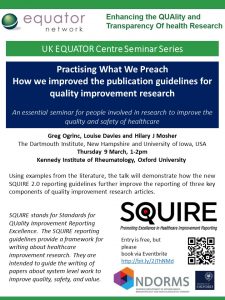
 Writing and publishing your QI work can be challenging. Navigating the requirements for journals as well as knowing what to include in a published peer-reviewed report of QI can make the task even more difficult. The Standards for Quality Improvement Reporting Excellence (SQUIRE
Writing and publishing your QI work can be challenging. Navigating the requirements for journals as well as knowing what to include in a published peer-reviewed report of QI can make the task even more difficult. The Standards for Quality Improvement Reporting Excellence (SQUIRE  Greg Ogrinc is a general internist working at the White River Junction VA Hospital in White River Junction, VT. He is the Associate Chief of Staff for Education and has served as the Senior Scholar for the White River Junction VA Quality Scholars Program. At the Geisel School of Medicine at Dartmouth, he is currently the Senior Associate Dean for Medical Education.
Greg Ogrinc is a general internist working at the White River Junction VA Hospital in White River Junction, VT. He is the Associate Chief of Staff for Education and has served as the Senior Scholar for the White River Junction VA Quality Scholars Program. At the Geisel School of Medicine at Dartmouth, he is currently the Senior Associate Dean for Medical Education. Thanks to the generous sponsorship of
Thanks to the generous sponsorship of 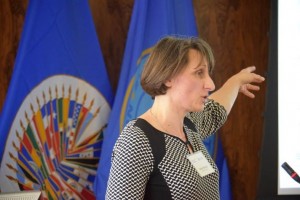
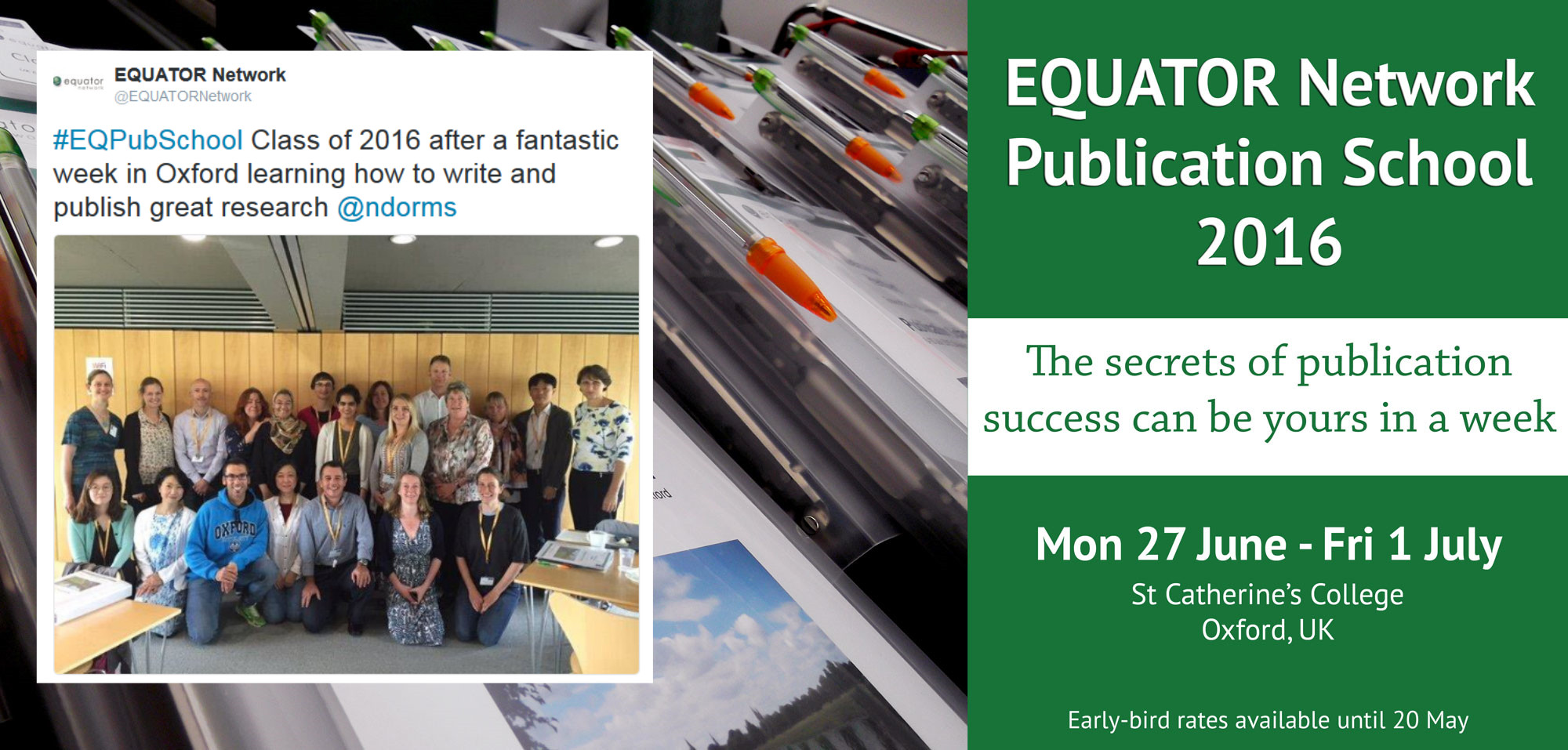 Twenty researchers and clinicians joined us for a week-long journey to create well-reported, clear research with an impact beyond academia.
Twenty researchers and clinicians joined us for a week-long journey to create well-reported, clear research with an impact beyond academia. Iveta Simera and Caroline Struthers were delighted to represent EQUATOR at the
Iveta Simera and Caroline Struthers were delighted to represent EQUATOR at the 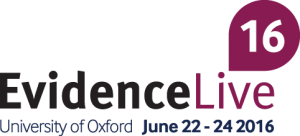
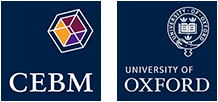
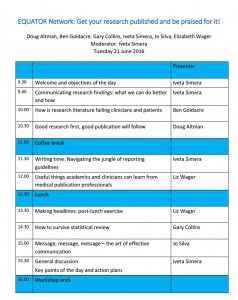 The
The 